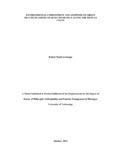| dc.description.abstract | The hospitality and tourism industry is one of the key economic sectors expected to take a leadership role in transforming the emerging green economy. The economic pillar of Vision 2030 in Kenya acknowledges the crucial function of natural resources. Direct promotion of these resources relate to environmental protection and efficient utilization of resources. Kenya stands to secure more incredible benefits from hospitality and tourism by 2030. Policy and strategy framework must be established to move away from intensive material and carbon approaches to delivering visitor experiences by implanting green practices. The stakeholders’ role in adopting green practices has seldom been investigated. In Kenyan hotels going green is a recent phenomenon that hotel sector management longs to adopt. Limited research studies have been undertaken to establish how environmental commitment influences the adoption of green practices in the Kenyan hotel sector. This study primarily sought to establish the effect of environmental commitment on adoption of green practices in star-rated hotels along the Kenyan Coast. To achieve this, the study sought to 1) establish current and potential green practices adopted in star-rated hotels along the Kenyan Coast, 2) determine the role of stakeholder engagement in the adoption of green practices, 3) establish the current and potential benefits of green practices adopted by star rated hotels, and 4) determine the moderating effect of environmental leadership on the relationship between environmental commitment and adoption of green practices among star-rated hotels along the Kenyan Coast. Using an embedded mixed methods design, quantitative and qualitative approaches were embraced. Sample hotels for the study were identified using stratified random selection. Stratification of management tiers for the choice of experts, general managers and heads of the section was applied. Data was obtained using semi-structured questionnaires, interview schedules and an observation checklist. Analysis of quantitative data included descriptive statistics and multiple linear regression, one sample t-test and moderated multiple regression using SPSS 21. Qualitative data were analysed thematically using NVivo 12. The results revealed a growing recognition and adoption of green practices among star-rated hotels along the Kenyan Coast (p=≤0.000≤0.05). The regression model with stakeholders’ engagement and perceived benefits was statistically significant [F (2,103) =151.736, p<.000]. The regression model explained 74.7% of the variation in the adoption of sustainable practices by the star-rated hotels in this study (R=.864, R2=.747). The effect of the stakeholders’ engagement (β =.760) and perceived benefits (β =.242) on the adoption of green practices was positive and statistically significant (p<.001 and p<.05, respectively). The regression model with the moderator (environmental leadership) explained 80.9% of the variation in the adoption of green practices by the hotels in this study (R=.900, R2=.809), demonstrating that the moderating variable accounted for an additional 6.3% of the variation, which was statistically significant (p<.001). Therefore, this study makes several recommendations. The results of this study suggest that stakeholder engagement, stakeholder perceived benefits, and the moderating effect of environmental leadership have a statistically significant effect on the adoption of sustainable practices among star-rated hotels in Coastal Kenya. In addition, this study has contributed to developing a statistical model with predictor variables that starrated hotels and capacity-building institutions can use to predict the adoption of green practices. This study recommends that star-rated hotels, in partnership with hotel associations and related capacity-building institutions, develop a standard framework for monitoring and evaluating stakeholders’ environmental expectations in adopting green practices by providing minimum performance indicators. | en_US |

